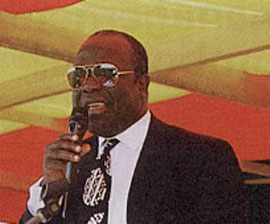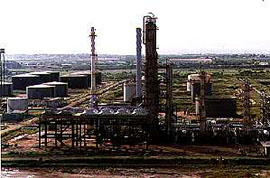 Mining and Energy Mining and Energy

Mining is booming in Ghana, once called the Gold Coast, and is easily one of the fastest growing sectors of the economy. There is a great flurry of activity at present, especially at the gold mines, which have seen rapid expansion in production capacity over recent years. New investments are also springing up, made possible through the Mines and Minerals Law enacted by the government in 1986. It provided all the incentives the sector had been looking for in one stroke.
According to Mr. Sam Jonah, CEO of Ashanti
Goldfields Company (AGC), the act "...reduced
the incidence of taxes, regulated the payment of
dividends based on profits, and provided an assured
access to adequate foreign exchange." Other
reforms and documentation of Ghana's mineral resources
have led to an upswing in mining activities, and
gold is now the leading foreign exchange earner
for the country. A Minerals Commission has been
set up to serve as a one-stop service for investors.

The government, through the new Minister of Mines and Energy, Mr. F. Ohene-Kena, is very committed to attracting investment. The government is assembling detailed geophysical data to assist interested investors in identifying potential areas of interest.
|
An industry leader accounting for over two-thirds of total country output, AGC was the first African operating company to be listed on the New York stock exchange , and, with an active presence at 35 sites in
12 African countries, it became Ghana's first multinational.
Despite its international profile, AGC is limiting itself to Africa for reasons Jonah explains: "We have said that we will stay in Africa and remain a gold mining company. Our presence here has withstood the country's great economic, political and social changes. We believe we have learned important lessons in the process that will help us handle similar situations elsewhere in Africa."
With a market capitalization of close to US$1.5 billion, Ashanti has 33 % of its stock owned by American investment funds. Though asserting that this level of American ownership has not changed the company much, Mr. Jonah admits that it makes the company more aware of its need to perform wellthe expectations of the U.S. market are high. Teberebie Goldmines is another American investment in the gold mining sector that has not regretted its investment in Ghana.
To enhance the performance of the mining sector,
the Precious Minerals Marketing Corporation
(PMMC), was established in 1988. The firm caters
primarily to small-scale gold and diamond miners,
purchasing at world market prices all the stones
they can produce. The company has been making significant
exports of jewelry to the United States, and recently
participated in a sales mission to the U.S. with
the Ghana Investment Promotion Center
(GIPC). Of the benefits accruing from this trip,
Mr. R.D. Damptey, managing director of PMMC, says:
"We are now discussing with an agent in the
U.S. which wants to introduce an Afrocentric line
in December of this year. They would like us to
manufacture some jewelry for them based on our own
African designs." |

